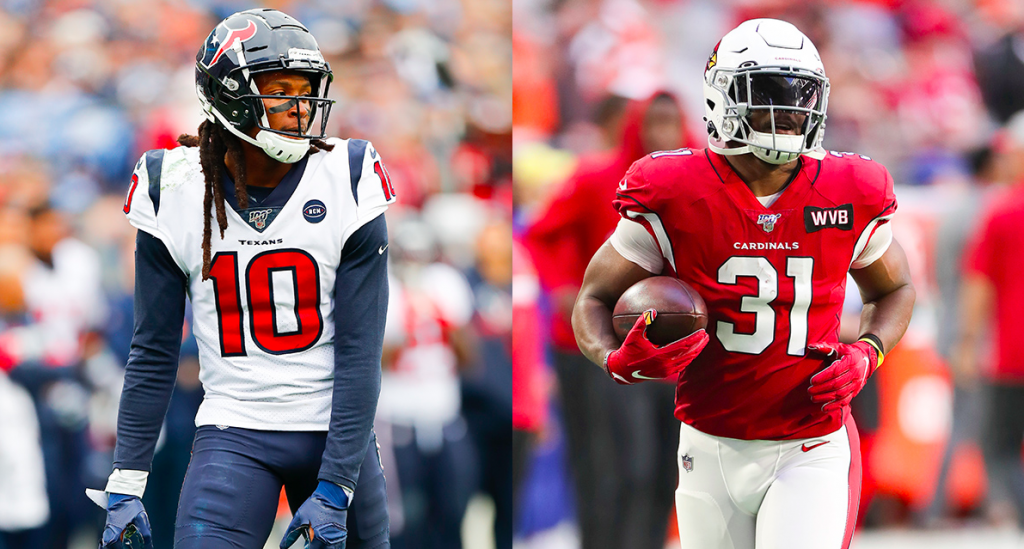The Houston Texans have never won a Super Bowl.
In fact, the Texans have never been to an American Football Conference (AFC) Championship Game. Trading wide receiver DeAndre Hopkins for Cardinals running back David Johnson will hurt the Texan’s chances of making the playoffs next season, let alone making it to the pinnacle of their conference.
A four-time Pro Bowler, Hopkins had 1,165 receiving yards and seven touchdowns last season. He has been first-team All-Pro for the past three seasons and, in 2015 and 2018, Hopkins had over 1,500 yards and 11 touchdowns, making him one of the most consistent producers at his position.
The trade sent Hopkins and the Texan’s 2020 fourth-round pick in exchange for Johnson, a 2020 second rounder and a 2021 fourth rounder. To put this in context, the Minnesota Vikings also traded away star wide receiver Stefon Diggs and a 2020 seventh-round pick to the Buffalo Bills this offseason. In exchange, the Vikings received the 22nd pick in this year’s draft, a 2020 fifth-round pick, a 2020 sixth-round pick and a 2021 fourth rounder. Diggs, who’s coming off of his best season statistically, has only two 1,000-plus receiving yard seasons in his career. Hopkins has five. The Texans should’ve been able to get a first-round pick for DeAndre Hopkins, and the fact that they didn’t is very disappointing. Since Amari Cooper, Odell Beckham Jr. and Brandin Cooks were all traded for first-round picks, the Texans should’ve at least gotten a better player if they were willing to settle for a second-round pick.
David Johnson, who may seem like a good running back after signing a three-year $39 million dollar contract extension in 2018, is no longer the workhorse he once was. Since getting 16 touchdowns and 1,239 rushing yards in 2016, Johnson has not topped the 1,000-yard mark. Due to injuries and ineffectiveness, nursing an injured ankle in Week 7, Johnson recorded an abysmal 345 yards and two touchdowns last season. He ultimately got demoted behind Kenyan Drake, for whom the Cardinals traded a conditional 2020 draft pick for. Drake never started a full season during his tenure with the Miami Dolphins, but he started all eight games with the Cardinals. Replacing Carlos Hyde, Johnson will get a chance to revive his career — but the Texans and Cardinals have similar offensive lines that gave running backs the ninth and tenth most rushing yards in the regular season last year respectively. Houston essentially gave up any chance of making the playoffs next season, as they traded the best wide receiver in the league for a washed-up running back.
For the Cardinals, pairing DeAndre Hopkins with future Hall of Fame wide receiver Larry Fitzgerald gives second-year quarterback Kyler Muray more offensive weapons to work with. Murray is a slight downgrade from Deshaun Watson, but Hopkins has played with 10 different quarterbacks over his career and still consistently produced. Hopkins had 1,521 receiving yards and 11 touchdowns in 2015, when he played with four different starting quarterbacks.
The Texans could’ve been a top contender in the AFC next season. Tom Brady’s move to the Tampa Bay Buccaneers means that the Patriots relinquished their stranglehold on the AFC. The Kansas City Chiefs won the Super Bowl last season, but the Texans led 24-0 in the second quarter of the AFC Divisional playoff game against them, showing that they are beatable. The Texans also beat the Chiefs in the regular season 31-24, demonstrating they can also best Kansas City. Houston went 10-6 in the regular season last year, but without Hopkins, the Texans will be worse next season.
To replace DeAndre Hopkins, the Texans signed Randall Cobb to a three-year, $27 million deal. Although Cobb is coming off a 828 receiving yard season, Cobb has nowhere near the same skill set that Hopkins does. Also, the Texans needed a first-round pick, as they don’t have one for this year’s draft or next year’s draft after acquiring offensive tackle Laremy Tunsil and wide receiver Kenny Stills from the Dolphins. If they had a first-round pick, the Texans could have picked a receiver from a rich draft class that includes Henry Ruggs III and Jerry Jeudy from Alabama, and CeDee Lamb from Oklahoma. Instead, Stills, Cobb, Brandin Cooks or Will Fuller will have to step up as the Texan’s number one receiver next season. It will be risky as Cobb and Cooks have to develop chemistry with Watson and learn the Texan’s playbook.
The Cardinals were the best organization Hopkins could’ve been traded to. He gets the chance to be mentored by Fitzgerald, who’s never fallen below 700 yards receiving in his 16-year career. Thirty-six-year-old Fitzgerald only signed a new one-year deal, meaning Hopkins can become one of the faces of the Cardinals franchise if he decides to retire after next season. If he doesn’t want to do that, he can leave as a free agent in three seasons, when he’ll only be 30 years old.
This trade also shows that Houston head coach Bill O’Brien should not be doubling as the team’s general manager (GM). Giving up two first-round picks for Tunsil and Stills, and trading Hopkins, showcases how bad O’Brien is as GM. O’Brien should stick to being a head coach, and should be relieved of his general manager duties in favor of someone more competent. By doing so, the Texans will have a slightly better chance at winning the Super Bowl.
But we all know that’s not going to happen.
After the trade went down, O’Brien cited Hopkins’ desire for “a raise” as one of the reasons he got traded. However, Hopkins said he had “no relationship” with O’Brien and he knew that “asking for a little raise” would force the trade. Ultimately, Hopkins got the result he wanted and O’Brien took a “deal that we felt was in the best interest of our team.”
Clearly GM O’Brien will continue to tank the Texans, and the team will never win a Super Bowl with the current direction they are heading in. They’ll be lucky if they make the playoffs next year.




Comments are closed.